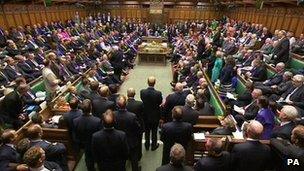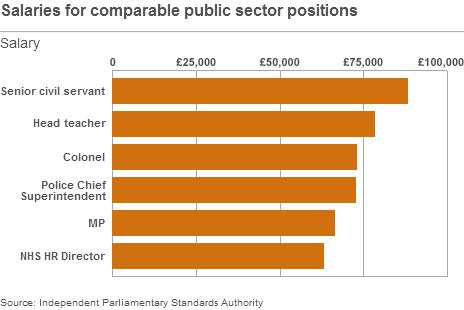MPs' pay: Party leaders told not to interfere
- Published

Many MPs believe their pay has been held down for years for political reasons
Party leaders have been warned not to interfere in an independent ruling on MPs' pay, due next week.
Parliament's expenses watchdog is expected to recommend a rise from £66,000 to more than £70,000 in 2015.
David Cameron has said such a rise would be "unthinkable" and Nick Clegg said he would not take one.
But Ipsa boss Sir Ian Kennedy said there was "no opting in or out" and political leaders should accept "you do not tell the regulator what to do".
He said putting off "hard decisions" on MPs' pay was what caused the 2009 expenses scandal - which led to Ipsa's creation. He said he wanted to remind "everyone, including leading politicians, that Ipsa was created by Parliament to effect a clean break with the past".
'No good time'
Sir Ian did not say what Ipsa (the Independent Parliamentary Standards Authority) would recommend, but confirmed its proposals would be published next Thursday.
"Of course, this is not a good time to be talking about the pay element of the package, save to notice that in the public sector pay increases are limited to 1% a year," he said.
"But given that there has never been a good time, this is as good a time as ever.
"Moreover, we know what happens when the element of pay is pushed aside as being simply too hard - the nods and winks school of public financing emerges, and ultimately we end up with circumstances like 2009.
"No-one wanted the system that brought Parliament to its knees in 2009 to come into being, but it was the inevitable result of hard decisions deferred."
Sir Ian also said Ipsa was "impressed" with a suggestion that, once set, pay should rise or fall in line with "the fortunes of those they represent" - national average earnings.
News broke earlier in the week that Ipsa was likely to recommend a big pay hike for MPs, at a time of pay freezes in the public sector and a general squeeze on living standards.
'Importance of restraint'
The prime minister said any rise for MPs "would be unthinkable unless the cost of politics was frozen" . His Lib Dem deputy Mr Clegg said he would not take a big pay rise, even if one were recommended, as people struggling with rising costs and pay freezes would find it "impossible to understand".
But many backbenchers, on lower salaries than ministers, have long believed they are underpaid compared with other professions and their pay has been held down for political reasons for years.
A Downing Street spokesman said: "The prime minister set out his position at the weekend and that position hasn't changed. Ipsa is independent. They are due to report shortly on the issue.

"We have submitted our views. Our views very much are around the importance of restraint, the importance of recognising the overarching financial climate, taking account of what we have done already around pay and pensions in the public sector."
Mr Clegg told BBC Radio 2's Jeremy Vine show he was against a rise but would not try to block it: "This is an independent decision. We took it out of the hands of MPs. I think that's absolutely a principle which must be maintained."
MPs used to vote on their own pay but from 2008, recommended pay rises were made by the Senior Salaries Review Body which were supposed to take place automatically.
However its recommendation for a 1% rise in 2011-12 was voted down by MPs, at the instigation of the government, because of a two-year pay freeze imposed on the public sector. In May 2011, powers to set and administer MPs' salaries passed to Ipsa.
MPs and members of the public will be able to take part in a consultation before Ipsa publishes its final plans - expected in the autumn - which would then come into force without the need for further legislation.
- Published1 July 2013
- Published1 July 2013
- Published26 June 2013
- Published10 January 2013